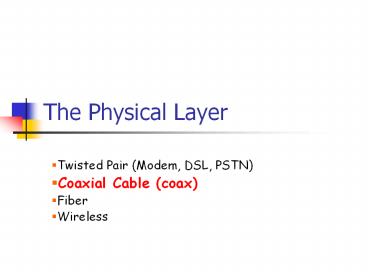The Physical Layer PowerPoint PPT Presentation
1 / 9
Title: The Physical Layer
1
The Physical Layer
- Twisted Pair (Modem, DSL, PSTN)
- Coaxial Cable (coax)
- Fiber
- Wireless
2
Coaxial Cable
- 50 ohm
- 75 ohm
- Bandwidth 1 GHz
3
Internet over Cable
100-2000 homes
DOCSIS Data Over Cable Service Interface
Specification
CMTS Cable Modem Termination System
HFC Hybrid Fiber Coax
4
Cable Architecture
New Services Opportunities
PacketCable
DOCSIS
CableHome
- HVAC control
- Fire sense control
- Security
- Air quality monitoring
- Child monitoring
- Energy management, etc.
CM
CM
CMTS
CM
MPEG Services
CM
CM
Operator Aggregation network
Operator Core Backbone
CM
CMTS
CM
CM
- Remote file sharing
- Shared calendar
- Unified messaging
- Managed services
CM
CMTS
IP Services
CM
CM
CPE
Headend
Backend
5
Cable Modems
- Typical details of the upstream and downstream
channels in North America.
6
Cable Broadband Spectrum Allocation
- TV band 54 550 MHz, 6MHz per channel
- Downstream 550 750 MHz
- 6MHz QAM-64 36 Mbps (gross), 27 Mbps (net)
- Total effective downstream bandwidth 200 / 6 27
891 Mbps - Upstream 5 42 MHz
- 6MHz QPSK 12 Mbps (gross), 9 Mbps (net)
- Total effective upstream bandwidth 37 / 6 9
54 Mbps
TV band 54 550 MHz, 6MHz per
channel Downstream 550 750 MHz 6MHz QAM-64
(6bit) 36 Mbps (gross), 27 Mbps (net) Total
effective downstream bandwidth 200 / 6 27 891
Mbps Upstream 5 42 MHz 6MHz QPSK (2bit)
12 Mbps (gross), 9 Mbps (net) Total effective
upstream bandwidth 37 / 6 9 54 Mbps
More if QAM-256
7
Cable Modem Operations
- Initialization
- New modem scans for system parameter pkt from
CMTS and announce its presence - CMTS assigns a downstream channel, an upstream
channel, and a minislot assignment (for
requesting upload bandwidth) to the modem - Modem determines its distance (ranging) via
response time - Reasons for ranging
- Upstream is divided into mini-slots (8 bytes)
- Each up pkt must fit in one or more consecutive
minislots - CMTS announces the start of a new round of
minislots periodically, but the starting gun is
not heard at the same time due to variable delays - Each modem computes the actual start time of the
first minislot by calibration with its CMTS
distance - Modem gets an IP address via DHCP
- CMTS and modem establish secret key
(Diffie-Hellman algorithm) - Modem completes its login to CMTS
- Upload process
- Modem request bandwidth via designated minislot
(req) - CMTS grants request by assigning needed minislots
to the modem (ack) - If Modem does not receive ack, wait for random
time to retry, double the retry time, etc.
(binary exponential backoff) - Download process
- No contention
8
DOCSIS Road Map
DOCSIS Key Features Benefits/Services
DOCSIS 2.0 (30 Mbps u/s)2002 Mandatory S-CDMA/ TDMA Best of DOCSIS Symmetric services Peer-to-peer Business-to-business (20 T1 capacity)
DOCSIS 1.1 (10 Mbps u/s)2001 QoS Pre-EQ Operations Security Tiered service Double u/s capacity Lower ops costs Better than competitor
DOCSIS 1.0 (5 Mbps u/s)1999 Specd for retail Standard spec High speed data Internet access
9
OSI DOCSIS DOCSIS
Application Application DOCSIS Control Message
Transport TCP/UDP DOCSIS Control Message
Network IP DOCSIS Control Message
Link IEEE 802.2 IEEE 802.2
Physical UpStream DownStream
Physical TDMA (mini-slots)5 - 42(65) MHzQPSK/16-QAM TDM (MPEG)42(65) - 850 MHz64/256-QAMITU-T J.83 Annex B(A)
Items in parenthesis refer to EuroDOCSIS, which
is a version of DOCSIS with a modified physical
layer targeted at the more DVB centric European
market.

